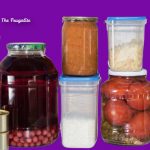(Psst: The FTC wants me to remind you that this website contains affiliate links. That means if you make a purchase from a link you click on, I might receive a small commission. This does not increase the price you’ll pay for that item nor does it decrease the awesomeness of the item. ~ Daisy)
By the author of the FREE online course Growing Self-Sufficiency: The Whole Picture
There are a few reasons why our beautiful planet could probably use a bit of help these days. A lot of plastics are in our oceans, harming sea creatures, and, apparently, little bits of those plastics are now in our bodies, too. Many places are facing water shortages and unprecedented droughts. Quite a few species are reducing in numbers for various reasons. This article is not about who or what might be causing these issues.
This article is about how doing a few small things that save you money just might also give our wonderful planet a break, too. Very often these days, it seems like helping the planet is portrayed as something that will cost us, and cost us dearly. This can lead to feelings of resentment towards the planet and the problems we are facing. These ideas range from large to small, but they all offer an opportunity to do something positive in these challenging times, and receive a benefit yourself! That’s a win-win situation. Isn’t some good news refreshing?
Reducing Water Usage
In our locality, the water cost has increased exponentially in the past few years. In one nearby city, you pay not only for your water but also a “sewer” charge for the volume you put down the drains. Now, there’s a good reason to conserve water if I ever heard of one!
 Here are some of the ways that I reduce my own water usage. I don’t waste anything! If I have a bit of water in my water bottle at the end of the day, it goes to the plants. I consciously reduce the amount of water I use for doing the dishes. The rinse water is clean enough it can be cooled down and also used to water the plants. Cooking or steaming water from veggies is super healthy: I have a friend who loves to drink his. I also use mine to water my plants. Water can also be saved by simply doing things less frequently: washing the car or floors, for example.
Here are some of the ways that I reduce my own water usage. I don’t waste anything! If I have a bit of water in my water bottle at the end of the day, it goes to the plants. I consciously reduce the amount of water I use for doing the dishes. The rinse water is clean enough it can be cooled down and also used to water the plants. Cooking or steaming water from veggies is super healthy: I have a friend who loves to drink his. I also use mine to water my plants. Water can also be saved by simply doing things less frequently: washing the car or floors, for example.
Want more tips in this are? Check out this great article.
Reducing your car usage will reduce wear and tear on your car and also save on gas. In my area, there are also new car insurance policies coming out for people who use their cars less frequently. One trip to town is never wasted: several stores are visited, and errands are also run for family and friends.
Local people out in the country might also bring a careless neighbor with them, who often chips in a few welcome bucks for gas. I used to use my car for entertainment, driving to the city to shop. This led to more spending! Now, I enjoy a daily walking program in a nearby local village. Doing this daily has allowed me to meet more people and enjoy nature. Learn how to thrive without a car in the city or country here.
Reusing Everyday Items
Many items that people throw away can be incredibly useful. Just yesterday, I needed some containers for the diatomaceous earth I was leaving at our local community garden. I wasn’t worried at all! I just reached into my stash of old applesauce containers and got two. I wash them, let them dry and then store them under the sink. I use them for the used coconut oil after oil pulling. You definitely would not want that going down your drains! Yes, I could just recycle those containers, but I get a heck of a lot of mileage out of them. Also, by reusing these and not buying plastic baggies or other containers, I’m reducing the amount of plastic I consume. That is just one example. Get creative! A second look at something you’re about to toss might give you some inspiration.
Selling Your Stuff Instead of Dumping
My motto about selling is that you never know until you try. Something that you are ready to send to the dump could be someone else’s treasure. Last summer, I cleaned out my sheds. I think I might be a packrat! That’s because I emptied and emptied and emptied those sheds and there is STILL stuff in them today.
By sorting through the stuff and selling some of it, I made some good coin. What I didn’t sell was that I set out on a table on the roadside for people to take for free. People took almost everything! That saved me dumping fees, gas to drive to the dump, and my valuable time, and it helped the planet by finding a good home for all those things!
Building an Eco-Friendly House
I know that building a house isn’t for everyone. However, if you are considering a building, think about the benefits of choosing a tiny house! With a smaller footprint, you need fewer materials and will have less space to heat…the list goes on and on. When I built my 432-square-foot eco-cabin, I also built in passive solar features that maximize the ability of the cabin to collect and retain solar heat. As a result, last winter in Eastern Ontario, Canada, it cost me less than $40 per month to heat my little home. Here’s a whole bunch of ways that tiny homes can save money.
Saving the Planet Can Save You Cash
Being environmentally friendly doesn’t have to cost ya. Could you see yourself trying any of the eco-thrifty tips offered here? Do you have one you can share with us? Please tell us in the comments below.
About Colette
Colette is passionate about sharing her knowledge of thrifty living and self-sufficiency. She has developed her skills in self-reliance living in the suburbs, the city, and more recently, on her own Half-Acre Homestead. Colette lived five years completely off-grid and without running water in an eight by 24 foot tiny home while designing and building her own 18 by 24-foot eco-cabin. Her website, Half Acre Homestead is attracting followers from around the world who want to become more self-sufficient. Colette invites you to stop by the Homestead and check out all of the great resources including the practical How To Guides, A Tiny Home Resource Center and her organic gardening stories on her blog. She shares her wholistic model (body/mind/spirit) for achieving self-sufficiency in her Free Course, “Growing Self-Sufficiency: The Whole Picture.” Stop by the Homestead today to register free of charge!











9 thoughts on “4 Ways to Save Money While Helping Our Planet”
I reuse paper towels that I have used for drying pans fo collect the peelings from vegetables before the peelings are taken to compost.
I occasionally buy individual cups of pudding then wash and save the containers to make individual serving of gelatin.
An occasional fast food meal yields way too many paper napkins that I save for messy meals at home to spare my regular cloth napkins from washing.
My winter heat is never ser above 68 and summer never goes below 78. Uses less electricity and also healthier.
I combine errands in my car and set them up for the least mileage. Sometimes this means putting one off a day or two if it isn’t urgent.
Hi Mary, Thanks for all of these! I love the idea to reuse the individual cups for Jello! Those individual servings would be handy, and you can make them yourself for less expense. Like you, I also collect up all my errands to save on gas. Much appreciated! Wishing you a cool and thrifty summer!
Glad to read the article. It had been awhile and I was beginning to get concerned about you. Hope you’re okay.
We don’t do the expensive solar energy stuff (actually, I don’t believe in it. I think it’s harmful to the environment with all the batteries, un-recyclable glass, etc.) but I absolutely do believe in and practice passive solar usage. We open our shades in the mornings and all day during the winter, and keep them closed while the sun is out in the summer. I’m not physically able to hang our clothes out on the line anymore, but sometimes I do hang them on a drying rack close to the wood stove in the winter.
Texas is hot during the summer and we do use the a/c, but except when the temps get up to 105 F., I try to make do without the kitchen window unit. And we use fans in every room.
I I’ve lived in Texas for many years so understand the heat. We installed ceiling fans in every room in the house which meant we use very little AC. We took advantage of cross ventilation also, opening windows on opposite sides of the house during the cooler part of the day. Most cooking done early in the day also helps.
Hi Carla, Thank you so much for your concern and kind message. Yes, I am OK, and enjoying my garden this season. I totally agree about the “hidden” costs of the solar energy stuff. Right now, I am sitting in my eco-cabin with all of the curtains drawn and a fan on me. Even though it’s fairly warm outside, especially in the sun. I’m comfortable. We don’t have runs of summer temps up around 105 very often here, although they do seem to be hotter than when I was young, “a long time ago!” Great to hear from you. Thanks for sharing!
I like the idea of reusing things, especially glass items, since in many places recycling is either a joke or an actual lie. Even in areas where there is recycling, too many times it involves loading everything up onto a cargo ship and sending it across the ocean in a bunker fuel guzzling container ship, where the country that buys the recyclables often uses less than wonderful ways to accomplish it. Electronic recycling too often involves burning all the plastic out from around the precious metals, resulting in huge clouds of smoke, in countries that allow it.
Meanwhile when I go to my natural foods store so many of the items come in glass – which my neighborhood doesn’t recycle – so I guess the best thing I can do is save them up and then eventually get into brewing my own beverages (such as kombucha) in them instead! Well ultimately that will result in less cost, I guess. It’s all such a balance.
I recently got reusable produce bags. I’ve started using reusable grocery bags too, though not 100%. I’m not charged for bags but it sure is nice not having to worry about things ripping through! I drive maybe once a week, combine errands and am lucky enough to work from home so I only have to fill my truck every few months. I guess one eco friendly thing I do is not buy all that many electronics! I use my computers till they wear out, ha ha.
Hi Redbranch, Oh dear! Those details about recycling are very far from the perfect images we are told about in our municipalities. So unfortunate! Ultimately, I focus on reducing my usage of just about everything. I agree about electronics! I’m typing away on my very very old laptop, bought over a decade ago from a huge Boxing Day Sale online, and it will be phased out in 2025 from Windows compatibility. I plan to keep using it until I can’t! Good for you for brewing your own kombucha. That stuff sure sounds healthy. Wishing you a summer filled with lots of reusing! Much appreciated!
I’ll tell you a secret – most of the time when they scream and yell about Windows Comparability, the device will work just fine anyway. I’m on a very old PC, which is still running Windows 7, and despite all the dire warnings it still works for everything I need it to do including anything online, making art, etc.
One more reusing tip for you! If you eat a melon you really like, and live in a hot climate, you can save the seeds for next year. I did that last year and am growing some big happy melon plants now. Save you five bucks on seed packets.
Hi Redbranch, ha ha! Thanks for revealing the truth about the Windows compatibility scare! How fabulous that you are enjoying melons from your Frugalite seed saving…..my mouth is already watering….too bad we’re not neighbours!!! Enjoy the harvest!